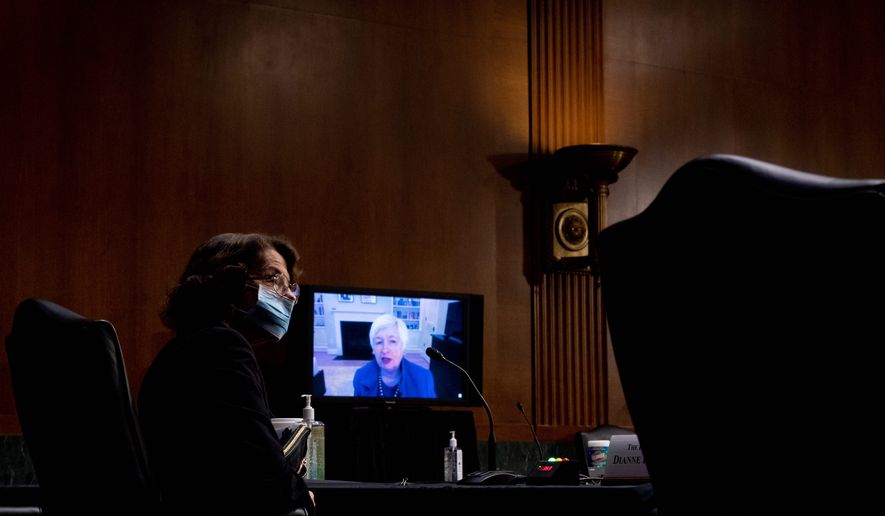Janet Yellen on Tuesday praised part of Republicans’ 2017 tax law that President-elect Joseph R. Biden wants to unwind as she pressed Congress to go “big” on another COVID-19 relief package and worry about the debt later.
The Senate confirmation hearing for Ms. Yellen, Mr. Biden’s pick for treasury secretary, underscored the difficulty Mr. Biden will have in convincing Republicans to go along with a $1.9 trillion economic rescue package — one of his top domestic priorities in the early days of his administration.
Ms. Yellen, the former chair of the Federal Reserve, said Mr. Biden isn’t planning to follow through right away on his campaign pledge to raise taxes on the wealthy and large corporations.
“Although the corporate tax cuts, I think, did improve the competitiveness of American businesses and President-elect Biden is not proposing to raise the corporate tax to the level before that act, it’s very important that corporations and wealthy individuals pay their fair share,” Ms. Yellen told members of the Senate Finance Committee.
Mr. Biden has talked about increasing the corporate tax rate from 21% to 28%. It was 35% before the Republican-controlled Congress passed a tax overhaul in 2017 that President Trump signed into law.
She said Mr. Biden does not want to repeal the entire 2017 tax law, which also included across-the-board tax rate cuts for individuals.
“The focus right now is on providing relief and on helping families keep a roof over their head and food on the table, and not on raising taxes,” Ms. Yellen said.
Ms. Yellen said she and Mr. Biden are concerned about the national debt in the long run, but that the current economic conditions necessitate an immediate infusion of taxpayer money into the economy.
“Right now, with interest rates at historic lows, the smartest thing we can do is act big,” she said.
Republicans signaled that even if they vote to confirm Ms. Yellen, they’re not going to support certain parts of Mr. Biden’s $1.9 trillion relief package — notably an increase in the federal minimum wage to $15 per hour.
“Obviously, an arbitrary government-mandated minimum wage increase is going to cost jobs,” said Sen. Patrick J. Toomey, Pennsylvania Republican. “If not, then of course we would just raise the minimum wage to $20 or $30 or $50 an hour.”
Ms. Yellen said research on the topic has shown that there would likely be minimal job loss associated with an increase to the minimum wage.
Mr. Biden’s proposal includes about $1 trillion in direct aid for individuals, more than $400 billion for coronavirus-related efforts like vaccine distribution and testing, and $350 billion for cash-strapped states and localities — the last of which is another red line for many Republicans.
Ms. Yellen also touched on other policy topics that would be part of her portfolio during the hearing.
She said the value of the U.S. dollar should be set by the market.
“The United States does not seek a weaker currency to gain competitive advantage, and we should oppose attempts by other countries to do so,” she said.
Ms. Yellen also vowed to create a “hub” within the Treasury Department to focus on climate change and said the Biden administration plans to confront China on global economic issues.
“China is clearly our most important strategic competitor,” she said, adding that it will be important to work with foreign allies on the matter. “We need to take on China’s abusive, unfair and illegal practices.”
Sen. Ron Wyden, the Oregon Democrat who will soon become chairman of the Finance Committee, said he’s hoping for a floor vote on Ms. Yellen’s nomination Thursday.
Democrats could take effective control of the House, Senate and White House as soon as Wednesday.
Mr. Wyden agreed with Ms. Yellen that the immediate danger is not to go big enough on an economic relief package.
“My top economic priority is avoiding the mistake Congress made in the last recession, which was taking a foot off the gas pedal before recovery took hold,” he said.
Sen. Chuck Grassley of Iowa, the committee’s outgoing Republican chairman, said lawmakers aren’t simply going to sign off on what his party calls a poorly-targeted economic package from Mr. Biden.
“Now is not the time to enact a laundry list of liberal structural economic reforms,” Mr. Grassley said.
• David Sherfinski can be reached at dsherfinski@washingtontimes.com.




Please read our comment policy before commenting.